The Samsung 950 Pro PCIe SSD Review (256GB and 512GB)
by Billy Tallis on October 22, 2015 10:55 AM ESTRandom Write Performance
The random write test is confined to a 16GB portion of the drive, which is otherwise empty. This allows the drive to demonstrate much higher performance than on our performance consistency test that fills the drive. Tasks like installing software updates can modify a lot of files, but aren't hitting the entire disk. Random writes to the entire disk are usually found only in enterprise workloads such as large databases.
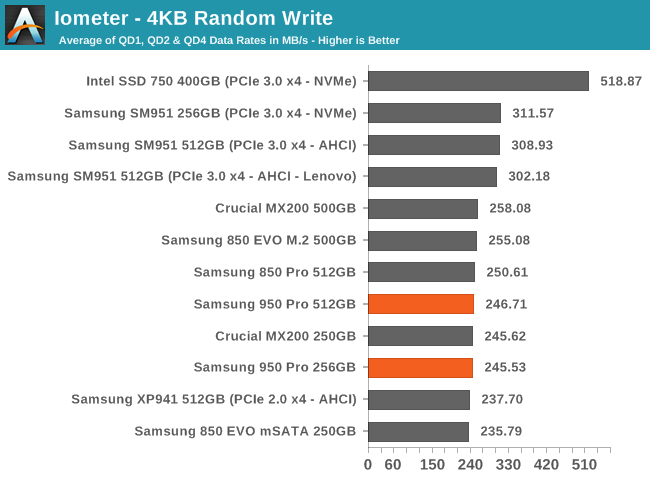
The 950 Pro's random write speeds aren't benefiting at all from the PCIe interface or the NVMe protocol, and are about 20% slower than the SM951. Since it's happening to both drives it probably isn't a thermal issue, so this may be the result of a firmware change. Still, the Intel SSD 750 is the only retail drive that significantly outperforms the tightly clustered competition.
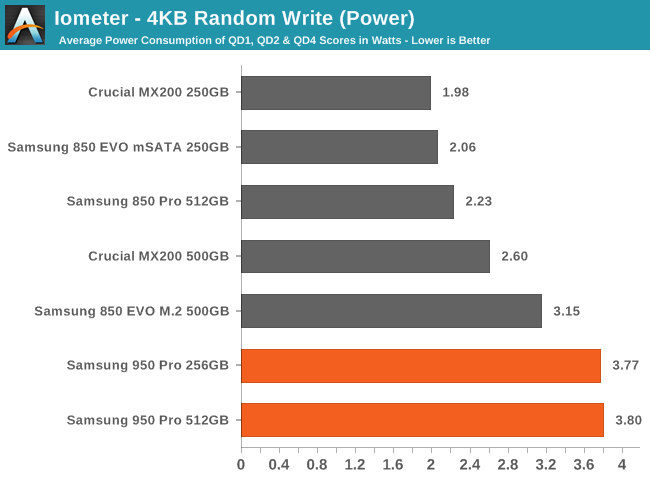
The higher power consumption during the random write test is a problem, since it's not buying any extra performance.
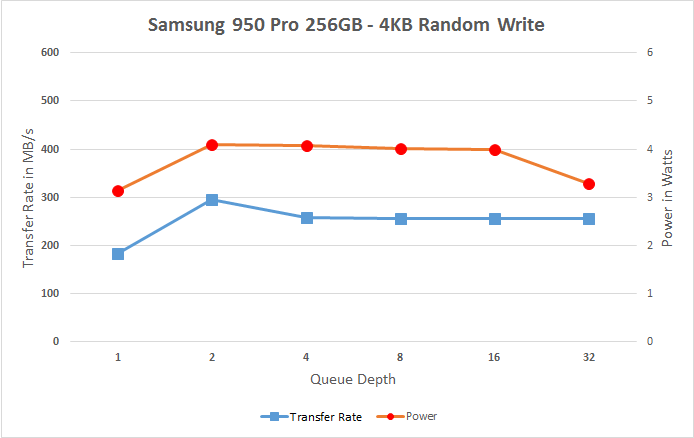 |
|||||||||
After increasing significantly from QD1 to QD2, performance and power drop slightly and stay flat for most of the rest of the test. At the very end, a slight drop in power for the 512GB and a more significant drop for the 256GB may indicate a change in what background processing is going on; the drive may be postponing some garbage collection during the onslaught of writes at the maximum queue depth, or it may be a coincidental case of the background processing catching up and throttling back near the end of the test.
Random Read Performance
Our random read performance test is conducted on a full drive and tests queue depths from 1 to 32. We focus primarily on the lower queue depths that are typical of interactive use, but also look at how the performance and power scales to more intensive loads. For desktop use, searching and virus scanning are typically the biggest sources of random reads, and they can exercise some of the larger queue depths.
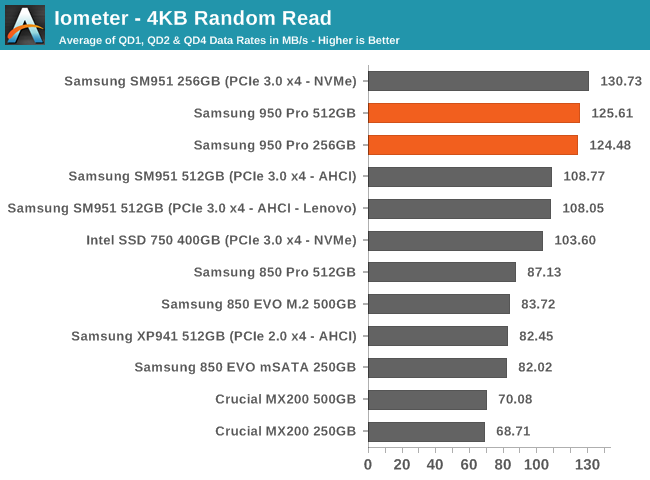
The strong random read performance of the 950 Pro provides great justification for its status as the a flagship drive for the consumer market.
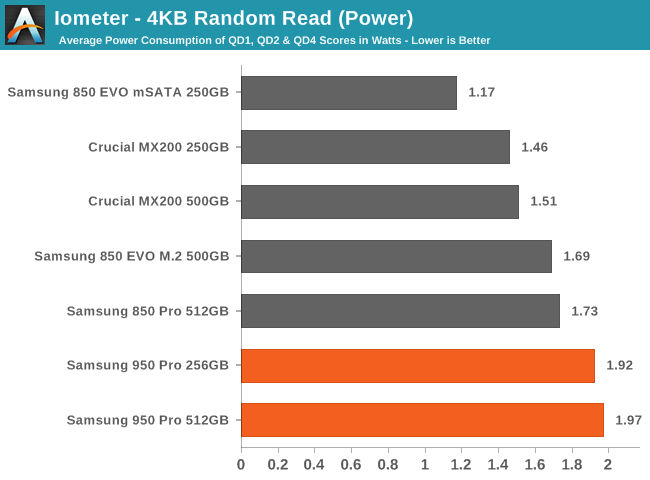
The 950 Pro's power consumption is moderately higher but nowhere close to being proprotional to the performance advantage; the 950 Pro doesn't have to run hot to offer great performance.
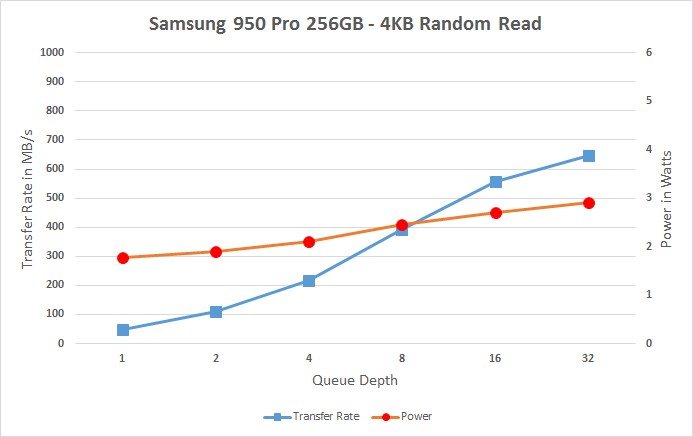 |
|||||||||
Power and performance scaling look very typical here, except I had to expand the performance axis for the 950 Pro. Both drives pass SATA's limits at or before QD16.










142 Comments
View All Comments
Gigaplex - Thursday, October 22, 2015 - link
What you're proposing isn't actually booting the drive. It's chainloading. The assessment is accurate, and chainloading is a long standing practice for this type of problem. It's also a hack that has no business being used for general consumer usage.R3MF - Thursday, October 22, 2015 - link
does the supplied samsung driver work with Win7, and is its use as simple as pointing the windows installer to a USB thumbdrive at the appropriate point?Billy Tallis - Thursday, October 22, 2015 - link
The Samsung NVMe driver was provided as an installer program. After running the installer, there was no need to explicitly change which NVMe driver was used for the 950 Pro. I tested it on Windows 7, 8.1, and 10.Badelhas - Thursday, October 22, 2015 - link
I have a Vertex 3 128GB SSD. Do you guys believe I will see real world gains if I upgrade to the Samsung 950 Pro 256GB?MrSpadge - Thursday, October 22, 2015 - link
If your usage is "normal" for a desktop, I suspect "no" is the answer. Unless you're doing a side-by-side comparison. Watch the disk drive LED on your machine. If it's glowing constantly you're being limited by the storage, otherwise not. Or look at the drive load in task manager (shown since Win 8).III-V - Thursday, October 22, 2015 - link
>For starters, the 950 Pro's power consumption increases as it heats up, and I've seen its idle power climb by as much as 4.5% from power on to equilibrium.Er, yeah, that's how typical transistors work... they get leakier as they heat up :\
boogerlad - Thursday, October 22, 2015 - link
What is the latency difference between having this ssd connected directly to the cpu, and through the pch? I'm very curious but no one has tested this.TelstarTOS - Thursday, October 22, 2015 - link
Performance is a bit of a mixed bag, but price/perf ratio is great.Waiting for intel countermove now :)
DIYEyal - Thursday, October 22, 2015 - link
Does it suffer from similar thermal throttling issues as it's predecessors (SM951 and XP941)? I have seen people putting a heat sink on these and they report improvement in sustained performance.theMillen - Saturday, October 24, 2015 - link
http://www.legitreviews.com/samsung-ssd-950-pro-51... will answer any heat throttling questions you have, ie yes! but a simple fan solves them :-p